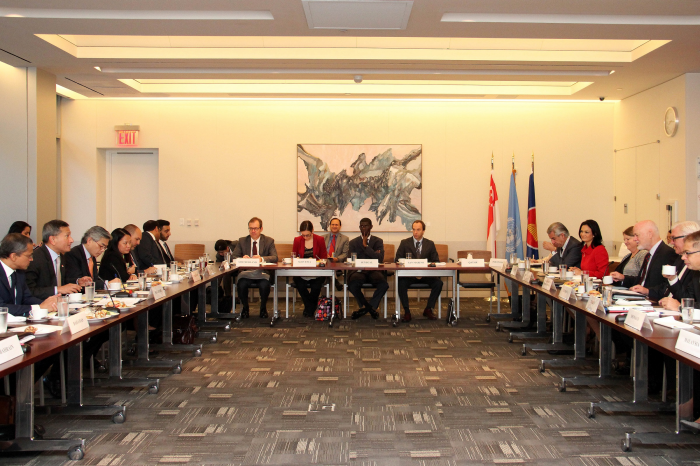
The Global Governance Group (3G) holds its 9th Ministeral Meeting in New York, on the sidelines of the 71st United Nations General Assembly. [Photo: MFA]
1 The Global Governance Group (3G) [1] held its 9th Ministerial Meeting in New York on 22 September 2016, on the sidelines of the 71st session of the United Nations (UN) General Assembly. As part of its efforts to promote a more effective, accountable and inclusive framework of global governance, the 3G invited the President of the 71st UN General Assembly, H.E. Peter Thomson, as well as the previous, present and incoming Presidents of the G20 (troika) –Turkey, China and Germany – to engage in a dialogue with the 3G during the meeting.
2 The 3G Ministers had a fruitful exchange with the G20 representatives on the outcomes of the G20 Summit in Hangzhou. The 3G Ministers welcomed the steps taken by the G20 towards greater inclusiveness and transparency, and commended the outreach efforts undertaken by China during its 2016 G20 Presidency. This was evident from the Hangzhou Summit having the highest number of invited guest countries. The 3G Ministers looked forward to the continued commitment of the G20 under Germany’s Presidency to engage non-members, including the 3G, as well as regional and international organisations, in particular the United Nations. The 3G Ministers reiterated their position on the role of international organisations with universal membership in global standard setting. This would contribute to reinforcing the complementarity between the G20, multilateral organisations and other key stakeholders.
3 The 3G Ministers noted that the global economic growth outlook is still weak and numerous downside risks remain, including international financial market volatility and sluggish trade and investment. In this regard, the 3G Ministers commended the G20’s efforts in developing the Blueprint on Innovative Growth, which sought to lift the medium-to long-term global growth trajectory through promoting new growth pathways such as enhanced structural reforms, innovation, the new industrial revolution and the digital economy. The 3G Ministers further commended the G20’s efforts in fostering a more stable and resilient international financial architecture, which will safeguard international finance stability and strengthen global economic resilience.
4 The 3G Ministers recognised the importance of an open, rules-based multilateral trading system under the World Trade Organisation (WTO) to usher in a new era of global growth. In this regard, the 3G Ministers welcomed the G20’s reaffirmation of its determination to ensure a rules-based, transparent, non-discriminatory, open and inclusive multilateral trading system with the WTO playing the central role in global trade. In particular, the 3G Ministers commended the G20’s commitment to ratify the Trade Facilitation Agreement by the end of 2016. The 3G Ministers were also encouraged by the G20’s commitment towards open trade and investment, reducing barriers to trade and resisting protectionism in all forms.
5 The 3G Ministers strongly welcomed the G20’s continued efforts to advance work on development, which is a key element in the G20’s long-term agenda. In this regard, the 3G Ministers welcomed the G20 Action Plan on the UN 2030 Agenda to support the full implementation of the UN’s 2030 Agenda for Sustainable Development, including strengthening policy coherence on sustainable development across each of the G20 workstreams to better support alignment with the 2030 Agenda. The 3G Ministers also welcomed the G20 Initiative on Supporting Industrialization in Africa and Least Developed Countries to inject impetus towards these countries’ efforts at sustainable industrialisation, one of the crucial drivers of economic development.
6 The 3G Ministers commended the publication of the Hangzhou Comprehensive Accountability Report (CAR), which provided a useful stock-take since 2013 of the G20’s progress on its development commitments, and its outreach efforts towards non-G20 countries and other stakeholders. The 3G Ministers noted that the G20 has made good progress in fulfilling its development commitments, and welcomed the acknowledgement in the CAR of the robust mutual engagement between the G20 and 3G.
7 The 3G Ministers appreciated the constructive engagement with China as the G20 Presidency in 2016, and looks forward to continuing the partnership with the German G20 Presidency in 2017. The 3G Ministers reiterated their position that the United Nations is the only global body with universal participation and unquestioned legitimacy, and emphasises that actions by the G20 should complement and strengthen the United Nations system. They supported efforts to ensure that non-G20 representatives are included in the G20 process in application of the principle of “variable geometry”.
. . . . .
22 September 2016
1 The 3G comprises the following Member States of the United Nations: Bahamas, the Kingdom of Bahrain, Barbados, Botswana, Brunei Darussalam, Chile, Costa Rica, the Republic of Finland, Guatemala, Jamaica, Kuwait, the Principality of Liechtenstein, the Grand Duchy of Luxembourg, Malaysia, the Principality of Monaco, Montenegro, New Zealand, Panama, Peru, the Republic of the Philippines, the State of Qatar, the Republic of Rwanda, the Republic of San Marino, the Republic of Senegal, the Republic of Singapore, Republic of Slovenia, Switzerland, the United Arab Emirates, Uruguay and the Socialist Republic of Viet Nam.